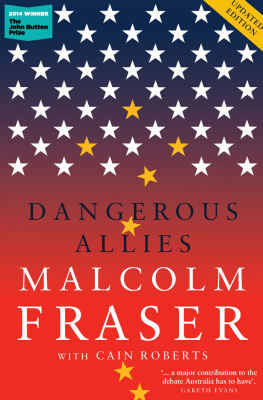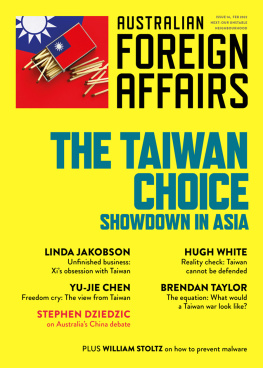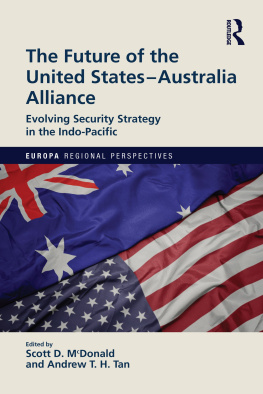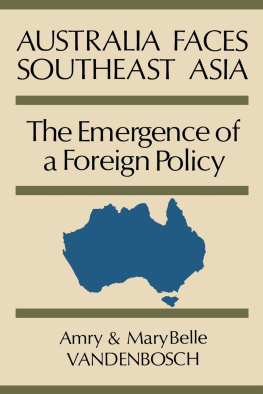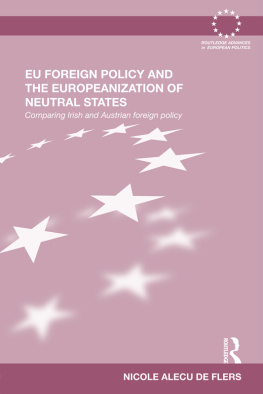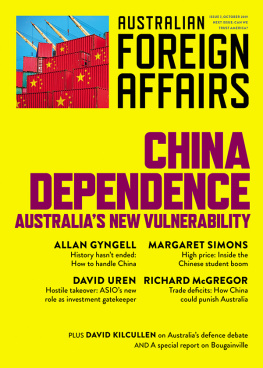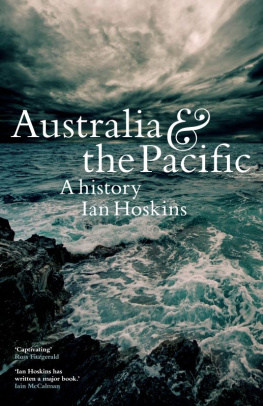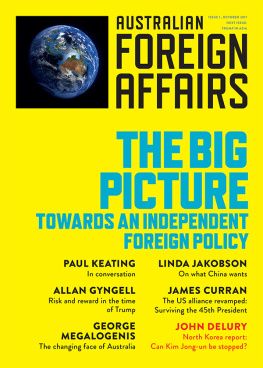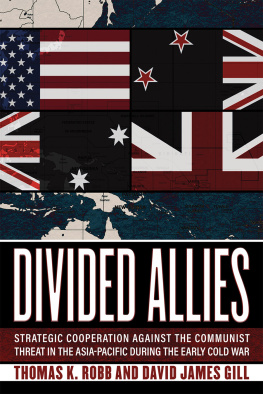the most radical book ever to have been written by a former Australian prime minister.
Robert Manne, Good Weekend
Fraser has been thinking deeply about Australian and global strategic questions for a very long time, and many of his observations show real strategic insight Frasers book deserves to be readas a spirited assault on our dangerous, and largely bipartisan, complacency.
Hugh White, American Review
Dangerous Allies is an important contribution to a vital question facing the country.
James Curran, The Spectator Australia
a thoughtful and nuanced history of Australian foreign policy. Fraser makes a persuasive argument Frasers calm voice, careful reasoning and meticulous presentation make Dangerous Allies recommended reading.
Chris Saliba, Books+Publishing
This fascinating book provides a useful overview of Australias dependence for more than a century on great and powerful friends.
John Blaxland, Canberra Times
Dangerous Allies is a sorely needed contribution to debate on Australias foreign policy and its future independence. Extremely well researched, with all the force of a tightly argued academic treatise Dangerous Allies is a bold and provocative call for Australia to completely rethink its strategic priorities in the 21st century.
The Saturday Paper
a serious and considered contribution to foreign policy debate
Troy Bramston, Weekend Australian
one of the most original and timely contributions to a debate that, with a few honourable exceptions, tends to be sterile, predictable and unchanged since the end of World War II.
Mark Beeson, The Conversation
Acknowledgements
A book of this kind cannot be written without a great deal of research and without resources. Melbourne University Publishing had wanted me to write the book. I am grateful for its support and encouragement and for the resources they made available.
Cain Roberts applied for and was chosen principally to do the basic research that would be required. He has, in fact, been much more than a researcher. His capacity to sort out facts and details is great. He has assisted in drafting. He has advised on the strength of an argument and where a paragraph might need modification. His point of view was always worth considering. I was fortunate that he has a basic interest in foreign policy and in the way in which foreign policy decisions are made. He understands the arguments, and at all times seemed interested in what the book was trying to say. His advice, his counsel and his research has done a great deal to help bring the book to completion. Thank you, Cain.
A number of people have assisted with certain aspects of the book. There are one or two who do not want to be named, but whose advice I value greatly. They will know who they are. The Parliamentary Library has also been very helpful in chasing sources and clarifications. The bibliography is testimony to the depth of research that has been undertaken.
Petro Georgiou and Denis White, two long-time friends and former staff members, read some early chapters, and their comments and criticisms were all thoughtful and helpful and very much to the point.
Richard Tanter, a professor in the School of Social and Political Sciences at the University of Melbourne, is a specialist in advanced techniques of modern warfare and strategic planning. The sections relating to naval capability, to missile technology, to the role of bases in Australia, have been checked for technical accuracy. His knowledge lends authority to those sections of the book. Tim McCormack, Professor of Law at the Melbourne Law School and the Special Adviser on International Humanitarian Law to the prosecutor of the International Criminal Court in The Hague, on anything with legal implications, has helped me on a number of occasions. He did a great deal of work in drafting the Statutes of the International Criminal Court. His advice has been wise and helpful, and again has assisted in maintaining accuracy in important parts of the book. I would like to thank both of them for their help.
Sally Heath, Executive Publisher at Melbourne University Publishing, gave advice on the structure and shape of the book, as the chapters unfolded. I would also like to thank Cathryn Game, copy-editor, for working assiduously and drawing attention to some important matters of detail that needed clarification.
I would especially like to thank Louise Adler, CEO of Melbourne University Publishing, who was instrumental in persuading me to write the book in the first place.
Julie Gleeson, who runs my office and has been with me for very nearly a quarter of a century, was absolutely central to the production of the book. I could not have done it without her assistance and her willing acceptance of an enormously increased workload. Julie is a first-class Executive Assistant. Through the course of writing this book she has shown a capacity for accurate research, which was helpful and, in some cases critical, in enabling the book to progress. I thank Julie very much indeed for all the help that she has given. Christine Walker has also been a willing and constructive help.
As always, Tamie has helped in innumerable ways and made it easier to bring the book to a conclusion. Thank you, Tamie.
Part I
Loyal to the Crown, dependent on Empire
there is no pretence of claiming the power of peace or war, or exercising power outside our territories.
Alfred Deakin
Part II
All the way with the USA
I make it quite clear that Australia looks to America
John Curtin
Part III
A time to end strategic dependence
I believe America is exceptional
Barack Obama
Notes
Introduction
. John Latham, Attorney General and Minister for External Affairs under Prime Minister Joseph Lyons, opposed ratifying the statute. Lewis claimed Latham felt that the blood ties between the Dominions was [ sic ] not something that could be legislated and formalised, and that certain parties, for their own ends, could use the Statute to ruin the Empire (quoted in Lewis, John Latham and the Statute of Westminster).
. A number of US Government reports point to this conclusion. For example, a 2007 report commissioned by the United States Joint Forces Command, and conducted by the Institute for Defense Analyses, examined captured official Iraqi documents post-invasion and found that, although Saddams regime had supported a variety of revolutionary, liberation, nationalist, and Islamic terrorist organizations, there was no smoking gun [i.e. a direct connection] between Saddams Iraq and al Qaeda ( Iraqi Perspectives Project , p. ES-1). Similarly, a 2004 Senate Select Committee report on pre-war intelligence also found that although intelligence pointed to some contact between Saddams Iraq and Al Qaeda, the CIA found that there was no evidence providing Iraqi complicity or assistance in an al-Qaida attack ( US Intelligence Communitys Pre-War Intelligence Assessments on Iraq , p. 347). See also Senate Report on Intelligence Activities Relating to Iraq Conducted by the Policy of Counterterrorism Evaluation Group and the Office of Special Plans Within the Office of the Undersecretary of Defense Policy, which also points to intelligence failures in this area.
1 Colonial foundations of strategic dependence
. Such sentiment was expressed by Australias first Prime Minister, Edmund Barton, who proclaimed to the Australian Parliament in 1903: Let us call ourselves Britons. In using the term Britons in Australia, I wish it to be as clear as possible that, in my belief, we have not forfeited, by our emigration, or by that of our fathers, any of the rights of Britishers at home, or any of our share in either the glory or the material prosperity of the Empire. We are Britons of Empire (extract from Barton, Speech by the Prime Minister and Minister for External Affairs in the House of Representatives, 7 July 1903, in Greenwood & Grimshaw (eds), Documents on Australian International Relations 19011918 , pp. 434).

